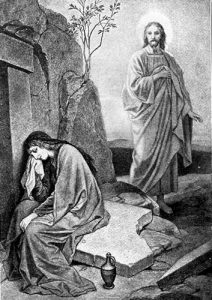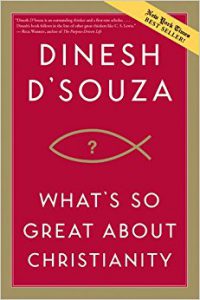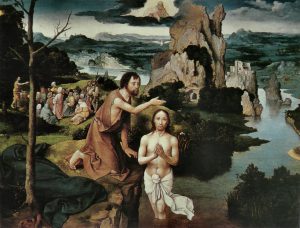The Gospel today says that Jesus healed a blind man. Do you believe this? Suppose I’m a non-believer and I say, “It never really happened. The early Christians just made it up to claim that Jesus was a miracle worker.” What are we going to say? Lots of people even say Jesus never existed. Do you know how many videos on YouTube say this, and how many hits they get?
People’s faith is shaken when they encounter these objections. I don’t think it’s enough to say, “I just believe.” Such a statement is good and right, but avoids the questions, and to avoid the questions makes people think we’re unreasonable and afraid.
Fr. Robert Spitzer, SJ gives an anecdotal story: some Catholic kids are in their final year of high school and during religion class one kid asks, “What if Jesus didn’t really walk on the face of the earth?” And all the other kids say, “Yeah…” If you don’t have a good answer, years of catechism go flying out the window and their faith is over!
Let’s focus our attention on one question today, a question that supports our faith and sets us up for next week’s homily. The question is: Are the four Gospels historically reliable or are they just made up?
Here’s a great video from the Alpha Course (which we run twice a year at ‘Gigi Blin’ cafe).
(6:40-9:50)
So the Gospels haven’t been changed over the past 2,000 years and are faithful to what the first-century originals say. But many people say, “Fine. But the Gospel writers in the first century were lying, making things up to win converts.” Yet it’s actually unreasonable to suggest they lied. Think about it: Why would they lie? Why would anyone make up a religion that would get them killed either by Jewish or Roman authorities? Because that’s what happened to the early Christians. Whenever you claim someone is lying, there must be a reason why they’re doing it; people make up stories only to get something good out of it. But there’s no advantage to the early Christians making it all up if it’s just going to get them killed.
And if they were lying, why did they constantly weaken their case? If you’re going to make up stories about what Jesus said and did, wouldn’t it be better to say it came from eye-witnesses? But they didn’t do this: They actually admit that two of the Gospel writers (Sts. Mark and Luke) never met Jesus. This fact shows the early Christians weren’t trying to stack the deck in their favour.
 And remember what we said about the Resurrection: Women couldn’t give public testimony in Jewish culture, so why would they make up a story about St. Mary Magdalene being the first to see Jesus risen? It just makes it harder to believe. Why not make up something more convincing? The most reasonable explanation is that they weren’t lying; they wrote it because they believed it was true.
And remember what we said about the Resurrection: Women couldn’t give public testimony in Jewish culture, so why would they make up a story about St. Mary Magdalene being the first to see Jesus risen? It just makes it harder to believe. Why not make up something more convincing? The most reasonable explanation is that they weren’t lying; they wrote it because they believed it was true.
Alright, so we know they were honest, but people still say the early Christians can’t be trusted because they were biased: They wanted these things to be true, they had an ideology and that skewed the way they remembered the facts. The response? Yes, ideology can skew facts, but not always. Take, for instance, Jewish people telling the story about the holocaust. Quite often the best historians are Jewish: they work very hard to preserve with accuracy what we know about the holocaust. Their passion for what happened forces them to dig deeper and examine the facts. So being committed to a cause doesn’t always skew the facts. On the other hand, quite often it’s the people who are separated from the events who make unhistorical claims (e.g. that the holocaust is blown out of proportion). They’re just going off superficial knowledge of the situation.
 Think about this: Have we ever realized that many people who say Jesus never lived are biased? They only see one side of the story because they don’t like Christians’ teaching on hell, sexual morality, etc. One atheist philosopher actually admits, “I want atheism to be true…. It isn’t just that I don’t believe in God…. I don’t want there to be a God; I don’t want the universe to be like that,” (Dinesh D’Souza, What’s So Great About Christianity? 267). They claim to be objective, but ignore historical facts just to discredit something they don’t like.
Think about this: Have we ever realized that many people who say Jesus never lived are biased? They only see one side of the story because they don’t like Christians’ teaching on hell, sexual morality, etc. One atheist philosopher actually admits, “I want atheism to be true…. It isn’t just that I don’t believe in God…. I don’t want there to be a God; I don’t want the universe to be like that,” (Dinesh D’Souza, What’s So Great About Christianity? 267). They claim to be objective, but ignore historical facts just to discredit something they don’t like.
Permit me a digression: Some of the people who are the most adamantly opposed to historical facts are Catholics! Why? Because, if they can discredit the Church, then they don’t have to follow Church teaching. If they can discredit Church authority, then maybe they don’t have to go to Confession. Some Catholic children sometimes attack the faith of their parents, saying, “Mom, Dad, the Bible’s not true. It’s all a legend.” Do you know why some say this? Because deep down they don’t want to go to Mass on Sundays. This can also happen in relationships: one spouse or boyfriend/girlfriend will attack the devout Catholic because the Catholic doesn’t want to use contraception or doesn’t want to have sex before marriage, etc.
Yes, Christians can be biased, but so can non-Christians and non-devout Catholics. We just have to find out what the truth is.
There’s lots of evidence to show that the Gospel writers were telling historical truth. Like we said before, for example, why would they include in the Gospels hard sayings of Jesus that wouldn’t win anyone over? They wrote down that Jesus commands us to hate our mother and father (Lk 14:26)—this doesn’t make your religion more attractive. They wrote down that Jesus didn’t know the day or the hour of His return (Mk 13:32), which makes Him look like He wasn’t an all-knowing God. The only reason why they included these ‘embarrassing’ sayings is because they felt obligated to tell the story accurately (Roch A. Kereszty, Jesus Christ: Fundamentals of Christology, 26).
Ever play the telephone game, where we sit in a circle, whisper a story in someone else’s ear and it keeps on going until the message is totally distorted? This is exactly, some say, what happened to the Gospel writers, who wrote over 20 years after Jesus died and rose—there’s no way they could remember all the facts accurately.
There are, however, two problems with this analogy: 1) The telephone game is designed to distort the message, which is why it has rules like one must whisper and tell the story only once. 2) The Gospels were written by a people from an oral culture. Most people didn’t read, so they worked on memorization in a way that’s totally unfamiliar to us. Jewish children were taught by parents and synagogues to memorize large portions of the Bible. Greek students could memorize stories up to 100,000 words, which is around five times as long as one of the Gospels. Even today, many orthodox rabbis have the scriptures memorized.
How is this possible? You start young and constantly repeat it, putting it to music, talking about it with friends and studying it. Remember: when you learn, you can never check what you know with books, so you have to memorize! Some people today know all the songs of the Beatles, and they never even tried to memorize them. When I was a kid, I knew the whole dialogue to the first three Star Wars movies, which is really embarrassing and shows I had no life. When we really care about something, as the disciples did about Jesus’ words and actions, it’s easy to memorize it perfectly.
 Next: If they were so accurate, why are there slight differences in the Gospels? For example, when Jesus is baptized, according to St. Mark, God says, “You are my beloved Son,” while according to St. Matthew, God says, “This is my beloved Son.” Which is it?
Next: If they were so accurate, why are there slight differences in the Gospels? For example, when Jesus is baptized, according to St. Mark, God says, “You are my beloved Son,” while according to St. Matthew, God says, “This is my beloved Son.” Which is it?
Two quick examples will help explain the answer: 1) Who’s seen Schindler’s List? It’s a good historical movie, but hate to break it to you, some parts were changed to make a dramatic point. But would anyone say, because of these dramatic changes, that it’s not a historical film? 2) When we go to a lecture and someone asks, “What did the speaker say?” do we not paraphrase? If someone says, “But that’s not accurate!” we’d say, “Yes it is! I may have missed a word, but that’s what he said! I remember!”
The answer is that the Gospels were written in what scholars call an “Informal Controlled Tradition.” It looks like this: Villagers in the Middle East gather together in the evening, in a room with couches lining the walls, to tell proverbs/poetry/parables/stories, and the whole point of the gathering is to preserve their traditions! People take turns telling the stories, usually the oldest ones doing so, and only those who have grown up in the community have a right to recite. (There’s a story about a man who lived in a village but wasn’t allowed to recite because he lived there for 37 years and the others thought that wasn’t long enough!)
 In this setting, when it comes to poems and proverbs, the reciter can’t make a single mistake. If he does, he is shamed publicly by the whole group (this is the control, preventing changes to the words!). But when it comes to parables and stories about historical people he is allowed flexibility
In this setting, when it comes to poems and proverbs, the reciter can’t make a single mistake. If he does, he is shamed publicly by the whole group (this is the control, preventing changes to the words!). But when it comes to parables and stories about historical people he is allowed flexibility
. If, for example, there’s a story with three scenes and a punchline at the end, the punchline has to be word-for-word perfect, and the three scenes, names of characters, and the conclusion must be the same. But they allow the story teller flexibility with regard to the dialogue and emotions of the characters. Even with this flexibility, no matter how many times the story is passed down, the coe never changes.
This is why the substance of the example above (Jesus is God’s beloved Son) is the same, but the details are different. That’s also why the Gospels are so consistent with every other historical source. That’s why archeology, computer analyses of words, and non-Christian writers (Jewish, Greek and Roman) confirm the most important historical points of the Gospels. And there are more tools to evaluate the historicity of the Gospels.
We are so blessed that our faith is reasonable and historical. We don’t have to be afraid when people question our faith. Jesus is real, He really did do miracles, He did heal the blind man, and that means He still does miracles today; He especially wants to heal our spiritual blindness, which is our stubbornness and resistance to Him. What the Gospels tell us is true.